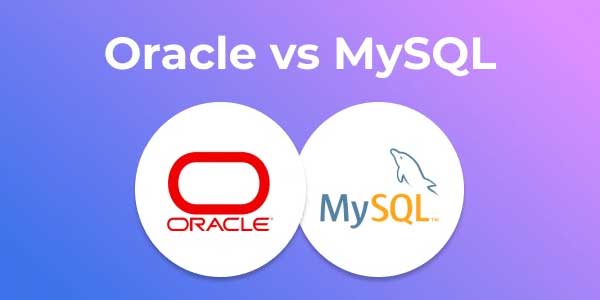
In Website development, choosing the right database management system is essential to ensure optimal performance. It rightly categorizes and structures data to create a better workflow. In website development, the two most popular databases used are Oracle and MySQL. But both have strengths and weaknesses that set them apart from the competition. To better understand and analyze, let’s look at these database tools and their usage in detail.
Table of Contents
An Overview Of MySQL:
Developed by Oracle Corporation, MySQL is an open-source relational database management system. It rose to popularity over the years primarily because of its robust performance, user-friendly interface, and excellent scalability. As it is open-source, several web development companies worldwide are adopting it. The ideal strength of this platform lies in its ease of use, which makes it a versatile choice for any developer to choose it.
Pros Of Using MySQL:
- Cost-Effectiveness: One of the crucial advantages of using this database is that it is quite effective and free to use for better variability. The open-source feature makes it one of the best budget-conscious choices for any developer.
- Performance: The performance value of MySQL is exceptionally high and effective concerning other options. This database can effectively handle extremely heavy workloads making it the number one choice for any user.
- Community Support: With a vast user community, MySQL benefits from continuous improvements and regular updates, ensuring stability and security.
Cons Of MySQL:
- Limited Features: The overall datasets for MYSQL are limited to some extent for offering exceptional and advanced features for better value.
- Scaling Challenges: Although it performs well with read operations, it may face challenges like handling large-scale write-intensive workloads simultaneously.
An Overview Of Oracle:
The Oracle Corporation has developed this dataset, one of the most potent and effective database management systems. It is considered a top relational database management system to offers exceptional performance over time. The best part is it can be run on any database system, making it the ideal choice for high-traffic and enterprise-level web applications. This database management’s extensive features, like security, performance optimization, and data management, make it the ideal choice for most web development companies. The ideal strength of this database lies in handling intricate queries and volume translations over time.
Pros Of Oracle:
- Scalability: Oracle is still considered the first database solution in several web development agencies in New York. One effective reason for this is that it offers high-volume transactions and can manage traffic with time without affecting the overall performance.
- Security: Advanced and effective security features offered by Oracle make it one of the top-selected databases for website development. Each exceptional security feature can be achieved using access controls and security features for data protection. It also enables the use of the ACID property to maintain the reliability and integrity of data.
- Advanced Features: Users also get a wider array of features like partitioning, clustering, and parallel processing, enabling developers to optimize database performance further.
Cons Of Oracle:
- Cost: Unlike MySQL, Oracle is a commercial product with licensing fees, making it a relatively costly option, especially for small-scale projects.
- Complexity: The robustness of Oracles comes with added complexities, and thereby, it requires selected developers to analyze and utilize the manner properly.

MySQL Vs. Oracle Performance Analysis
Performance And Scalability:
Effective performance and scalability are essential when choosing an effective database management system. Now, MySQL has been developed to offer faster read operations, making it ideal to be optimized and used for any website for data and effective retrieval needs. It is also exceptional and well-suited for web applications that generally experience considerably moderate traffic and data queries.
On the other hand, Oracle can handle more complex queries by handling more extensive and effective dataset queries. However, the high concurrency of its application makes it the ideal choice for large companies to handle workloads in no time. Thereby, web development services in NYC appropriately select both of these databases based on the traffic rate.
Cost Considerations:
It is true that to facilitate a better and more effective website having an appropriate database management system is the key choice. Due to this reason, several organizations even step back from utilizing the use of proper databases when developing websites. This is where the need for MySQL comes into effect for the ideal solution. Being an open-source platform, it offers effective solutions for most businesses. To get more advanced features, MySQL also offers paid value and enterprise versions.
As an enterprise-grade solution, Oracle comes with licensing costs that might be a substantial investment for small to medium-sized businesses or startups. It is essential to carefully evaluate the project’s budget and requirements to determine if Oracle’s advanced features justify the additional cost.
Ease Of Use And Maintenance:
MySQL’s simplicity and user-friendly interface make it an excellent choice for beginner website developers in NYC to utilize this database management system. Its widespread adoption has led to a vast community that offers extensive documentation, tutorials, and support. The ease of usage of this database system reduces the external drive for teams to properly utilize it within a short period.
On the contrary, Oracle has a quite steep and complex learning curve due to its extensive range of feature sets and functionality. It is best suited for organizations with experienced database administrators who can efficiently manage its complex configurations and performance optimizations. While Oracle provides robust support and documentation, its advanced features require a skilled team to leverage its potential fully.
Security And Reliability:
Website security is paramount in this digital age when several security attacks occur. MySQL and Oracle offer robust security features, ensuring data integrity and protection against unauthorized access. MySQL provides advanced security measures, making it suitable for small to medium-sized websites with less stringent security requirements.
On the other hand, Oracle is an effective enterprise-grade solution that boasts comprehensive security capabilities, making it the right choice for large organizations. It boasts several advanced security features like fine-grained access control, advanced encryption, and even auditing features for sensitive data protection. When choosing between the two databases, proper analysis of web development services in the USA is essential.
MySQL Vs. Oracle: Which One To Choose?
Now that we have discussed the essential details of both these database sets let’s know when to choose either.
MySQL:
- Companies with limited budget considerations looking for a cost-effective solution
- Websites comprising predominantly quiet heavy workloads
- Websites looking for simple usability over extensive and advanced features.
Oracle:
- Organizations dealing with critical and quiet large-scale projects over time
- Need of advanced features for exceptional performance and advanced features
- No single-out budget constraint as such
Conclusion:
To conclude, there are both strengths and weaknesses in these two databases. While MySQL excels in offering simplicity and cost-effectiveness for small projects. Oracle stands out in offering feature-rich advanced solutions for enterprise-level website development. Therefore, when comparing MySQL vs. Oracle performance, both have their pros and cons, as mentioned above. But when selecting one from the best web development company, business needs to properly examine their working choices and project requirements to ace the selection process.

 About the Author:
About the Author:
















Be the first to write a comment.